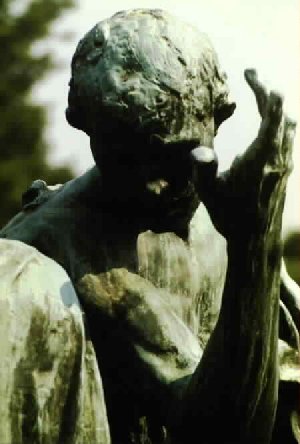Rodin and Rilke
Today, Rilke circles about Rodin. The University of Houston's College of Engineering presents this series about the machines that make our civilization run, and the people whose ingenuity created them.
I was just at my favorite used book store. When I bought a rare book there last month, a look of regret crossed the clerk's face. He'd meant to read it first. So I lent it to him. Now I've reclaimed my copy of Rilke's book on Rodin.
You all know the sculptor Rodin. He carved The Thinker. When you circle around Rodin's statue of The Kiss, that moment between man and woman keeps shifting in meaning and balance. One way or another, all Rodin's work does that to you.
Maybe you're less familiar with the poet Rilke. He wrote wonderful austere verse. It's demanding -- hard to translate. Rodin was born in 1840. Rilke was 35 years younger.
Rilke drifted into Rodin's orbit like a straw moving into a whirlpool. First, he married Rodin's student. The marriage soon ended. Maybe Rilke loved Rodin's art better than he loved Rodin's student. Then a German publisher commissioned him to write Rodin's biography. So he packed off to Paris to meet his hero.
In 1903 Rilke finished the biography, and he finished the poems for his Book of Hours. And sculpture touches those poems. He says,
... the gestures of your warm
wise hands, rounding themselves to form
and circumscribe the shapes that are to come.
Compare a line from the biography with one in the Book of Hours. In the biography, Rilke says.
Completeness is conveyed in the armless statues of Rodin: Nothing necessary is lacking.
Then that idea recurs in his poetry:
... I can conjure you at will.
Break off my arms, I shall take hold of you
and grasp you with my heart as with a hand;
Rilke became Rodin's secretary. Later he moved in with him. Rilke's towering poetry stands free of Rodin. Yet Rodin is there -- this silent man, completely committed to excellence.
In Rodin's Burghers of Calais, six brave volunteers stumble out of the starving city to die. Edward III held Calais siege in 1347. Finally, he said he'd spare the people in exchange for the lives of six noble citizens and the keys to the city.
Once I tried to photograph that great bronze. I circled it in vain. Each view was a whole new idea. I was trying to stuff smoke into a paper bag. Rodin told me far more about fear, nobility, courage, and sorrow than my camera and I could ever digest.
Rilke says, "Rodin has made each of these men live again the last concentrated moment of life." But then, both Rilke and Rodin did that. They concentrated so much human experience into one space -- you can never see it whole. You can only turn those two giants about in the light -- and become wiser.
I'm John Lienhard, at the University of Houston, where we're interested in the way inventive minds work.
(Theme music)
Rilke, R.M., Rodin (tr. by J. Lemont & H. Trausil). New York: The Fine Editions Press, 1945.
Elsen, A.E., Rodin. New York: The Museum of Modern Art, 1963.
See also the Encyclopaedia Britannica entries on Rilke and Rodin.
The bookstore mentioned in the program is the Detering Book Gallery, 2511 Bissonnet, Houston, TX 77005. The quotations are from Rilke, R.M., Poems from the Book of Hours (tr. B. Deutsch). New York: New Directions Publishing Corporation, 1941. The full texts of those two untitled religious poems are
I read it in your word, and learn it from
the history of the gestures of your warm
wise hands, rounding themselves to form
and circumscribe the shapes that are to come.
Aloud you said: to live, and low: to die,
and you repeated, tirelessly: to be.
And yet there was no death till murder came.
Then through your perfect circles ran a rent
and a cry tore,
scattering the voices that not long before
had gently blent
to utter you,
to carry you,
bridge across the abyss --
And what they since have stammered
are the fragments only
of your old name.
* * * * * * * * * * * * * * * * * * * * * * *
Put out my eyes, and I can see you still;
slam my ears to, and I can hear you yet;
and without any feet can go to you;
and tongueless, I can conjure you at will.
Break off my arms, I shall take hold of you
and grasp you with my heart as with a hand;
arrest my heart, my brain will beat as true;
and if you set this brain of mine afire,
then on my blood I yet will carry you.

Photo by John Lienhard
Detail from Rodin's Burghers of Calais